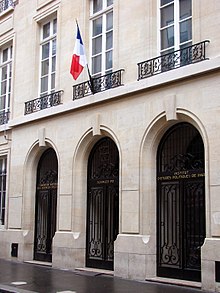Sciences Po
![]()
Sciences Po is a redirect to this article. For other meanings, see Sciences Po (disambiguation).
The Institut d'études politiques de Paris (IEP de Paris) (German: Institut für politische Studien Paris), usually called Sciences Po, is a grand établissement with headquarters in the 7th arrondissement of Paris. Together with the Collège de France or the elite École des hautes études en sciences sociales (EHESS), the Institute enjoys the highest academic prestige of all higher education institutions in France due to its administrative status.
In the QS World University Ranking, Sciences Po ranked 2nd in the world in Political Science and International Studies in 2021. The university thus ranks directly behind Harvard and ahead of the University of Oxford. Sciences Po accepts less than 10 percent of all applicants.
Founded by Émile Boutmy in 1872, the private École libre des sciences politiques was nationalized in 1945 and divided into the Institut d'études politiques de Paris (IEP) and the Fondation nationale des sciences politiques (FNSP). After the Second World War and until the 1990s, the newly created institute mainly prepared students for the concours (entrance exams) to the main administrative universities in France, in particular the École nationale d'administration (ENA). In fact, a large proportion of ENA students come from the Paris IEP. For example, in 2008, of the 80 applicants accepted, 62 had previously undergone training at Sciences Po. As a result, France's political elite consists almost exclusively of graduates from the IEP.
However, mainly due to the reforms introduced under the now deceased director Richard Descoings, the academic focus today is much broader and includes not only political science, but also, for example, law, economics, finance, marketing, communication, urbanism/urban planning, management or journalism. Accordingly, over 80% of graduates today turn to the private sector after graduation. In fact, most members of France's business elites, such as the CEOs of major corporations, also attended Sciences Po for at least a few years, as a Sciences Po degree was often considered a ticket to more elite schools in France. Today, however, study at the Paris IEP is a well-rounded course of five years that ends with a master's degree - not least because of the introduction of a compulsory year abroad in the 5th and 6th semesters and a compulsory internship of usually six months in the last two years of study.

Main entrance at 27, rue Saint-Guillaume
Status in the higher education system in France
Sciences Po is counted among the so-called Grandesécoles of France, where admission is highly selective and the social status of the degree is higher than that of most other universities. Sciences Po also has the status of a grand établissement. This is an administrative status granted to only a few institutions. As a result, Sciences Po has a relatively high degree of autonomy from the French Ministry of Education and can, for example, decide independently on the charging of tuition fees. In general, together with the natural science École polytechnique, the administration academy ENA and the business school HEC, it is one of the best universities in France and is considered one of the most renowned universities in the world in the field of social sciences.
International
Sciences Po is considered to be particularly internationally oriented. 40 percent of students come from abroad. The establishment of the so-called campus internationaux outside Paris has made a particular contribution to this development. These have focused their academic program on a different country or region and also offer courses in the corresponding languages, so that foreign students are primarily attracted to these programs. However, only the Bachelor's program can be completed at these campuses; all students gather at the Paris campus for the Master's program, which is primarily in French.
Worldwide, the IEP has more than 300 partner universities where students spend their 5th and 6th semesters, unless they choose the long-term internship option. Double Master programs are also offered with a number of prestigious universities worldwide (see below). Sciences Po is a member of the Global Public Policy Network (GPPN), which also includes Columbia University New York, King's College London, the London School of Economics and Political Science (LSE), the Hertie School of Governance in Berlin, and the Lee Kuan Yew School of Public Policy at the National University of Singapore (NUS).
Search within the encyclopedia